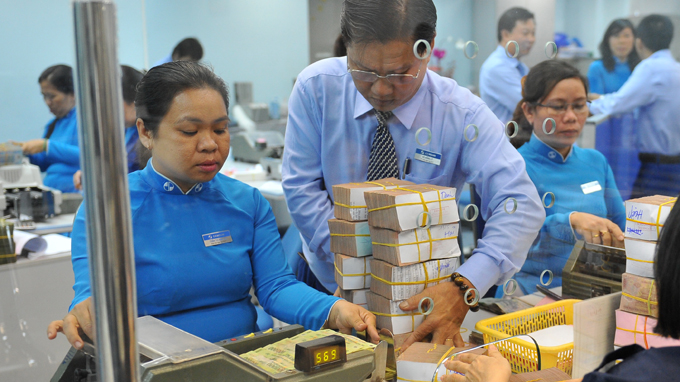The national asset management firm, or Vietnam Asset Management Co (VAMC), was founded last week to buy non-performing loans from banks in an effort to revive the economy choked with bad debts but will it work?
Managed by the State Bank of Vietnam (SBV), it was established on Decision No.1459/QD-NHNN signed by SBV Governor Nguyen Van Binh on June 27, 2013.
“VAMC must sketch out a specific roadmap for the bad debt settlement process so that the rate must be scaled down to a manageable level as prescribed by the government,” said Nguyen Van Binh, governor of SBV at the opening ceremony of the firm in Hanoi last week.
Also at the ceremony, Nguyen Huu Thuy, deputy SBV governor cum VAMC general manager, said VAMC won’t force local banks to sell bad debts to them.
“We expect that local banks can realize their responsibilities and their rights and actively sell their bad debts to unload their debt burdens and make their balance sheets healthier,” he added.
"Although operating just like a normal asset management company, the firm has many special characteristics as the government has given specific regulations only for the VAMC, said governor Binh.
“It is very hard to run the firm as SBV lacks practical experiences, while the experiences in operating such an asset management company vary from one country to another,” he added.
"VAMC plays an important role in the context that the scale of bad debts has exceeded the handling capacity of each individual credit institution,” said Deputy Governor Dang Thanh Binh, chairman of the VAMC’s Board members
Under the government’s Decree 53 on VAMC dating back to May 28, any credit institution with a bad debt rate of 3 percent over their total outstanding loans will be required to sell the debt to VAMC.
The firm is expected to handle approximately VND80-100 trillion (US$1.88-4.7 billion) in bad debts with recoverable ratio of 20-40 percent. In 2013, the central bank expects VAMC to handle about VND40-70 trillion worth of bad debts.
In doubt
Many local and international banking experts have raised their concerns over the fact that VAMC, a long-awaited agency set up to help relieve bad debts dragging the whole economy, cannot solve the problem in the local banking system as expected.
With a chartered capital of just VND500 billion (US$24 million), many fear that its available financial resource is too small compared to the volume of total bad debts. Total bad debts are estimated to amount to some $7.8 billion out of $130 billion worth of total outstanding loans.
In Vietnam, bad debt accounting for less than 3 percent is considered an acceptable rate, but after exceeding 3 percent in early 2012, the bad debt ratio increased continuously and peaked at 4.93 percent, according to the data submitted to SBV by local banks.
The rate edged down from 4.86 percent to 4.08 percent by the end of December 2012, but it then rose and remained stable from 4.5- 4.7 percent recently.
But according to SBV’s calculations, the rate was higher, and it fell from its peak at 8.6 percent in the first quarter of 2012 to 6 percent by the end of February 2013, and then dropped further.
However, Nguyen Huu Thuy, General Director of VAMC, told Dau Tu Chung Khoan newspaper that in addition to funding from special bonds, VAMC can also borrow from many international organizations.
"There are many international organizations interested in VAMC, and we have held several meetings with them, and some others are on schedule," Thuy said.
Earlier, economist Le Xuan Nghia, former head of the National Financial Supervisory Committee, told Hai Quan newspaper that SBV can raise capital for VAMC so that it can issue more special bonds to buy back bad debts, or refinance directly to the bank commercial loans with relatively long term, for example, 3 years.
Evaluating the impact of VAMC on the economy, JP Morgan said in a report that the establishment of VAMC is "the most positive step so far in the effort to revive the Vietnam’s economy".
Meanwhile, a number of other organizations said that VAMC cannot solve the problem of the quality of bank assets without significantly improving regulatory policies.
“The creation of a Vietnamese asset management company (VAMC) to buy non-performing loans (NPLs) is unlikely to fully resolve the banks' asset-quality problems unless accompanied by meaningful regulatory improvements,” said Fitch Ratings in a press release on July 9.
“With no fresh capital, the banks are likely to be limited in their ability to restructure and support the domestic economy.”
“We believe Vietnamese banks may still face capital-impairment risks even after offloading bad debt to the VAMC, based on preliminary data. This is because government-guaranteed bonds received in consideration for bad debt must be written off by a reported 20% each year, which effectively means that the bad bank only buys time for the banks to write off losses,” it added.
|
Do Minh Toan - General Director of Asia Commercial Bank (ACB), told Thoi Bao Ngan Hang magazine under SBV that ACB is willing to sell VND1.5 trillion worth - if verified – of bad debts, or half of its total bad debts, to VAMC. Toan said that the sale of debt will help fund the bank’s working capital and increase the capital circulation of the bank. |


















































